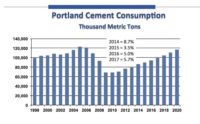Alongside swarms of contractors and other industry professionals pouring in to see the latest in concrete equipment, tools and products at the annual World of Concrete trade show in Las Vegas, the Portland Cement Association released a relatively rosy economic forecast for 2020 into 2021.
“The economy is strong,” said Ed Sullivan, PCA executive vice president and chief economist at the early February event. “We expect to see continued moderate economic growth.”
His forecast outlines continued modest growth in both real dollars spent on construction and in overall cement consumption over the next several years.
Strong consumer demand and a robust labor market are the main drivers, and Sullivan said there are no signs yet of the economy overheating.
“We’ve been growing on now over eleven years. It’s the longest economic recovery ever,” noted Sullivan. “Recessions don’t just happen, they are caused, typically in respond to excessed,” says Sullivan. “And because this has been the slowest growing economic recovery…it also [has] the smallest growth. It doesn’t generate those excesses, it doesn’t create a need for recession.”
But a long, slow recovery does have potential downsides. While the leading indicators are still good, there are potential shocks that could derail the U.S. economy going into 2021 and 2022. “Let’s face it. As you go for eleven years, as recovery ages, it loses some of its zip. It loses some of its vigor,” added Sullivan.
The current economic expansion is getting a bit long in the tooth, and Sullivan sees signs of major metropolitan regions of the country entering a “late-stage-recovery” where the local economies are beginning to cool. “As you lose some of that zip, you become more vulnerable to potential disruptions,” he says.
“What are those risks, what could knock us off? Well it was the tariffs, and we looked at the possibility they could actually hurt the economy, and we worked that through. And they did detract from overall economic growth, but it never sent us negative,” said Sullivan. “And a global slowdown with the threat of Brexit, and now you got this virus out there—and it still didn’t push us to negative growth.”
Shifting winds in Washington, D.C., are a major concern for PCA, and there are several possible policy changes that could affect the economy and by extension the construction industry over the next year. Sullivan is closely watching for a surge in federal spending on infrastructure, particularly a possible expansion of FAST grants.
Congress will have to deal with the further extension of sequestration, where automatic budget cuts could be triggered by inaction or gridlock.
Sullivan added that regardless of the outcome of the U.S. presidential election this fall, PCA expects the industry to have to adjust to new climate-change legislation and policies.
He expects to see major climate policies implemented at either the federal level or at the state level in the next few years, depending on the outcome of the election.







Post a comment to this article
Report Abusive Comment